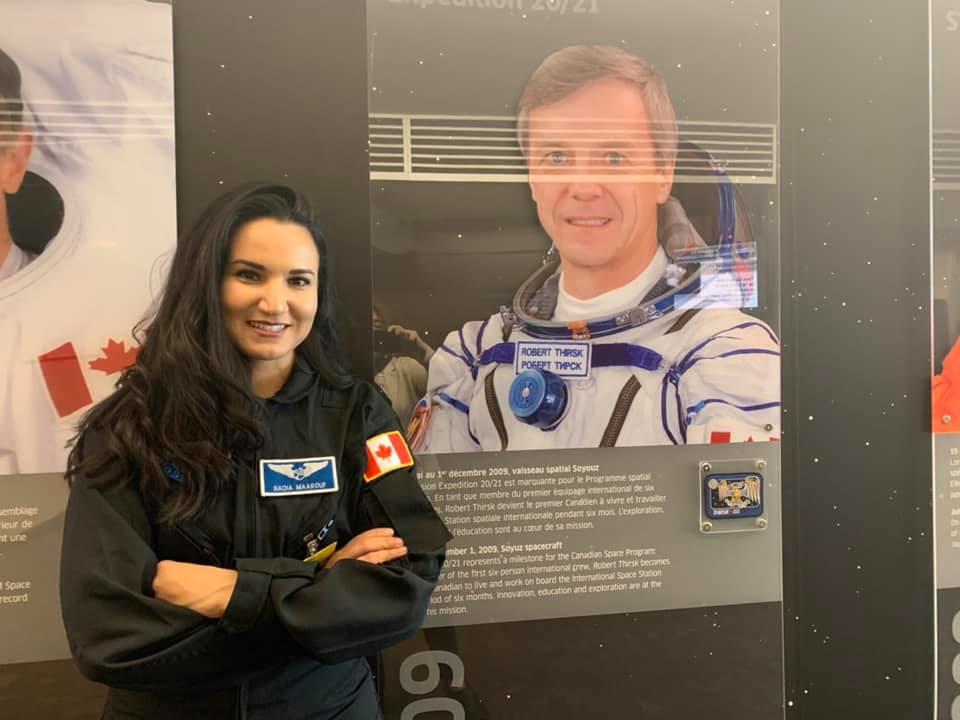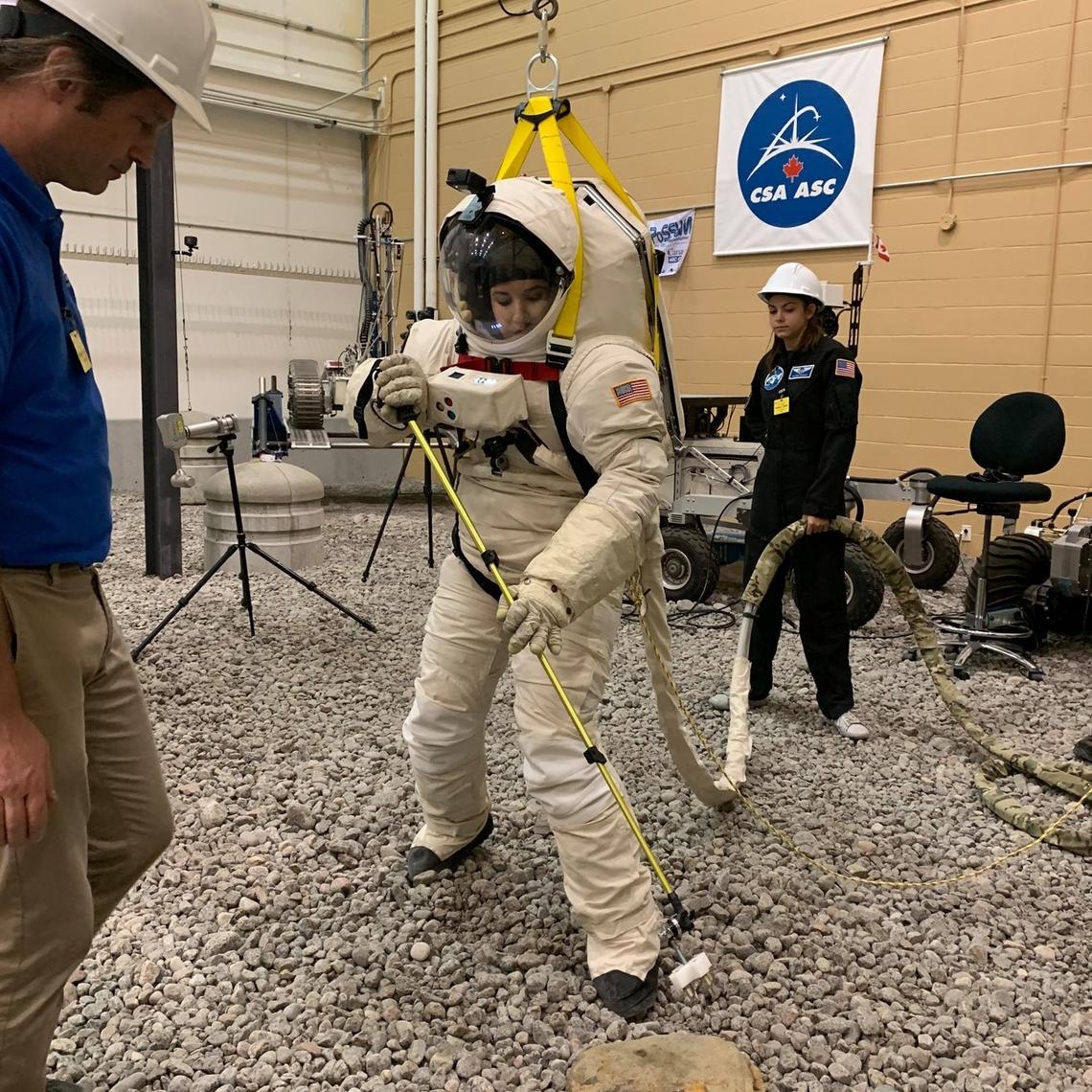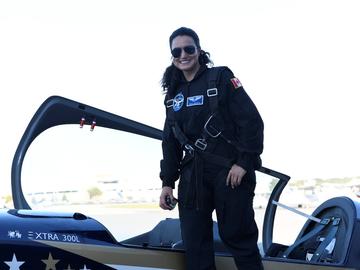Aug. 20, 2021
Alumna’s cardiology research snagged her a spot at the Mars Desert Research Station

- UCalgary Alumni's series, Careers in Motion, includes interviews with alumni who are innovators, thought leaders and powerhouses in their field.
Meet Dr. Nadia Maarouf, PhD’19, who is currently a clinical research associate in the Cumming School of Medicine’s Department of Clinical Neuroscience (full-time) and an astronaut/scientist candidate (part-time). It was Maarouf’s PhD thesis that helped snag her a place in the November 2021 mission at the Mars Desert Research Station.
What, exactly, will you be doing in the upcoming (simulated) Mars mission?
I will be serving two roles. The first is that of a crew medical officer who will monitor and report on my crewmates’ physical and mental health states to Mission Control. Secondly, I will be a crew medical scientist who will conduct medical experiments that will help (us) understand and mitigate some of the challenges associated with longer space travel missions to Mars. These will include continuous biomonitoring, exercise countermeasures, and task-induced stress analyses in response to isolation and confined space living.
When you were a student at UCalgary, did you have any idea what you wanted to do for a career?
A physician-scientist was, and remains, my career goal. It is just utter serendipity that one of the top focus areas in deep-space health care is preventive cardiology research (my PhD thesis and citizen-science research).
How did you get interested in space? Any pivotal moments?
I was born and raised in rural Morocco where space and astronautics are unreachable fantasies. Unlike most of the astronauts and aspiring astronauts I’ve met, it wasn’t a childhood dream I could realistically entertain. Actually, it was during my PhD studies at the U of C that I had a “light bulb” moment when I stumbled on a paper while preparing for my candidacy examination which analyzed the parallels of space travel and vascular aging: the cardiovascular system ages by (approximately) 20 years for each (approximately) six months spent in microgravity continuously. Basically, we have no choice but to solve this health issue before sending astronauts to Mars and, by doing so, we are tackling the leading cause of death and disability globally: cardiovascular disease (according to the World Health Organization in 2021). It’s a win-win affair and I want to contribute to it!

One of Nadia's seminal moments was a meeting with alumnus Dr. Robert Thirsk
Where do you live now? And what is your area of research?
Calgary is my home and “base-camp.” It is the perfect location to work and study while I can climb and dive in the mountains and lakes to maintain my certifications in my spare time. In a typical year, I would travel to Montreal for extravehicular activity (EVA) training with the Canadian Space Agency (CSA), Ottawa (parabolic flights with the National Research Council), Daytona (theory and exams/aeronautics/hypoxia training), Connecticut (spacecraft egress and rescue operations and life-support systems), Groton (Mass., for underwater analogue) and Utah (Mars analogue mission).
What is your dream job?
My first dream job was an Olympic Tae Kwon Do athlete. Alas, I will have to settle for a physician-scientist at the moon or mars base hospital.
Who has had the greatest influence in your career and what did you learn from that person?
My father’s heart attacks and subsequent terminal illness is the greatest influence that highlighted the critical importance of clinically relevant research. This is what made me pursue grad school and a PhD in cardiac sciences (and an MD soon). However, when it comes to space travel and space-medical research and its implications in cardiovascular disease, it is undoubtedly former UCalgary Chancellor Dr. Robert Thirsk (retired Canadian astronaut, MD, BSc (Eng)’76, Hon. LLD’09), whom I first met at the Emerging Leaders Forum at the U of C, an event that I was invited to in 2017 while I was serving as the CRSA (Cardiovascular and Respiratory Student Association) president. It was a mentorship session, and we discussed my PhD project where the topic of cardiovascular-system challenges for astronauts arose. My interest in space medical research was solidified then and I was determined to, somehow, get involved. I have since met Dr. Thirsk a few more times at the CSA during meetings such as Canadian Healthcare in Deep Space and Lunar Workshops. He is one of those incredible human superstars who have achieved so much, yet are modest and relatable with a contagious, “you, too, can do it” attitude. I want to be like him when I grow up and pay it forward!

Nadia in Montreal, for extravehicular activity (EVA) training with the Canadian Space Agency (CSA)
Are there mistakes you’ve made during your career and, if so, what lessons have you learned from them?
Well, I did very poorly during my undergraduate studies, mainly due to my involvement in international-level competitive sports; I was a four-time British national champion in Olympic-style taekwondo and won other international titles in Africa, Korea and Europe. This low GPA led to many rejections of grad school applications in the U.K. when I eventually decided to focus on my studies. Fortunately, the University of Glasgow gave me a chance and that’s where I graduated with distinction — this degree got me into a PhD program. That said, I cherish the lessons I learned from international-level competitive sports . . . teamwork, independence, discipline and resilience were crucial to my growth and are assets that I still use today to push through difficult times. All in all, I have absolutely no regrets!
Do you have any favourite movies or books?
As for books, I love Endurance by Scott Kelly, Le Premier Homme by James Hansen and The Grand Design by Stephen Hawking. Some of my favourite movies include The Theory of Everything by James March, Hidden Figures by Theodore Melfi and Apollo 13 by Ron Howard.
Who were your childhood heroes?
Chuck Norris — and I have him to partially thank for inspiring me to get my taekwondo black belt at the age of 12. And my father who was a rare feminist, where I grew up, and the only superman I ever met.
Advice for other students now who may be interested in space?
Don’t let your GPA or any other standardized test score define your potential or hold you back. Whether it is a graduate degree in space studies or astronaut candidacy or space agency internships, intelligent selection committees from top-tier universities and agencies are now recognizing the value of evaluating applicants as unique individuals and not as mere test scores anymore . . . so just apply for opportunities when they become available and, if you don’t succeed, apply again. You will get there if you are dedicated.
















